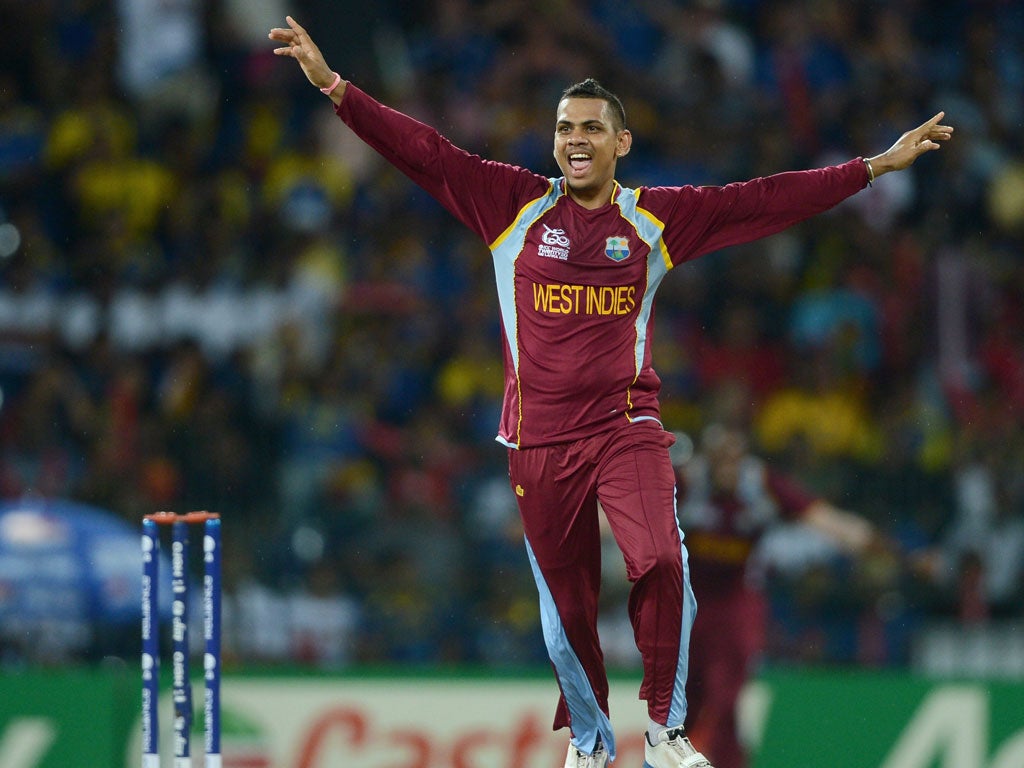West Indies win World T20 final against Sri Lanka by 36 runs

Your support helps us to tell the story
From reproductive rights to climate change to Big Tech, The Independent is on the ground when the story is developing. Whether it's investigating the financials of Elon Musk's pro-Trump PAC or producing our latest documentary, 'The A Word', which shines a light on the American women fighting for reproductive rights, we know how important it is to parse out the facts from the messaging.
At such a critical moment in US history, we need reporters on the ground. Your donation allows us to keep sending journalists to speak to both sides of the story.
The Independent is trusted by Americans across the entire political spectrum. And unlike many other quality news outlets, we choose not to lock Americans out of our reporting and analysis with paywalls. We believe quality journalism should be available to everyone, paid for by those who can afford it.
Your support makes all the difference.Marlon Samuels inspired a West Indies fightback from the brink to deny Sri Lanka a home win and triumph themselves instead in the ICC World Twenty20 final.
Samuels' memorable 78 revived the Windies, after it appeared they had fluffed their lines terminally, on the way to an improbable 36-run victory at the Premadasa Stadium.
In a showpiece match which saw the majority of bowlers excel themselves, and almost all the batsmen stumble on centre stage, Samuels bucked the trend emphatically with a 56-ball innings containing six sixes and three fours on a fair pitch.
How the West Indies needed him, though, after an embarrassing false start to their innings in which master blaster Chris Gayle could make only three from 16 balls.
Even after Samuels had transformed proceedings, it seemed West Indies had almost certainly fallen short of a winning score with their 137 for six.
But it was to be Sri Lanka who truly froze as what appeared a near routine chase featured a mid-innings collapse of six wickets for 21 runs - for a final product of 101 all out in the 19th over, and just the Windies' second International Cricket Council global trophy since the 1979 World Cup.
But the match had started ominously badly for them.
Their famed big-hitters were simply nowhere to be seen for the first half of their innings, as initial caution went to extremes - and Ajantha Mendis (four for 12) took most advantage.
Angelo Mathews and Nuwan Kulasekera used the new ball well, but it was still bizarre that the West Indies should take until the fifth over to reach double-figures.
Their achingly slow start was under way with four dot-balls from Mathews to Johnson Charles, who reacted to the fifth by mistiming a catch to mid-off.
After that wicket-maiden - number three Samuels let the sixth ball, his first, go - there was not a run on the board until Kulasekera bowled a wide halfway through the second over.
Around 40 was probably par in powerplay. But after Gayle took nine balls to get off the mark, with a scampered single to mid-off - and was eventually lbw pushing forward to Ajantha - the Windies could muster only 14 for two in their first six overs.
They had a solitary boundary at that point, punched past cover by Samuels off Kulasekera.
It was not until the 12th over, after Kulasekera had dropped Samuels at long-off on 20 off Jeevan Mendis, that birthday boy Dwayne Bravo added a first six to go with the four - over midwicket off Akila Dananjaya.
But Samuels clubbed consecutive sixes off the returning Lasith Malinga, over midwicket and extra-cover, and then a third in the over, beyond long-on.
The 13th over therefore cost 21 runs.
Bravo was to go to lbw, even though bat might have been involved, pushing forward to Ajantha to end a third-wicket stand of 59.
Yet when Samuels brought up his 50 with his fourth six, over long-on off Jeevan, West Indies were at last striking to their potential.
It seemed too much had been left too late, though, an impression underlined after Ajantha put himself on a hat-trick - Kieron Pollard cutting, and well-held at backward point, and Andre Russell lbw sweeping.
Samuels was eventually sixth out, caught in the leg-side deep off Dananjaya, but captain Darren Sammy gave his team a late lift by taking 16 off Kulasekera's final over.
That feelgood continued for the Windies when Ravi Rampaul produced an excellent first delivery, knocking out Tillekeratne Dilshan's off-stump to see him off for a duck.
The early breakthrough was a necessary starting point for Sammy's men, but scoreboard pressure appeared minimal while home captain Mahela Jayawardene and Kumar Sangakkara were sharing a second-wicket stand of 42.
Not until Sangakkara picked out deep midwicket with a pull at Samuel Badree did the Sri Lanka wobble kick in.
Mathews somehow managed to be bowled round his legs, off-stump, trying to sweep Sammy.
The lynchpin himself, Jayawardene, had already been dropped twice but could not make it count when he reverse-swept Sunil Narine into Sammy's hands.
Then the collapse went into overdrive as Jeevan and then Thisara Perera were both haplessly run-out.
There was no way back - despite some late hitting from Kulasekera - after Lahiru Thirimanne, the last specialist batsman, also bowed to the pressure by holing out in the deep.
A shell-shocked home crowd of 35,000 capacity had assembled to cheer Sri Lanka all the way to their first 'World Cup' success since 1996.
Instead, they witnessed the unlikeliest of denouements as West Indies got their hands on some silverware to add at last to the Champions Trophy of 2004.
PA
Join our commenting forum
Join thought-provoking conversations, follow other Independent readers and see their replies
Comments